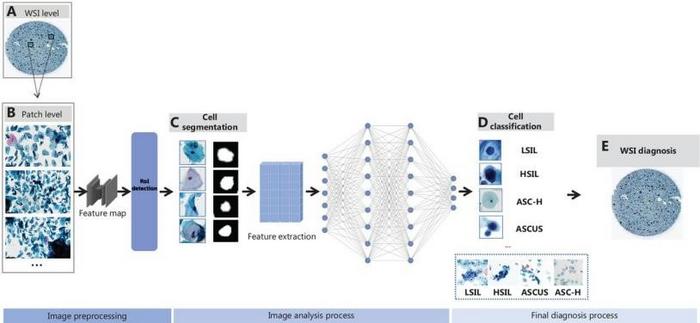In a revolutionary advancement for women’s health, recent research has illuminated the potential of artificial intelligence (AI) in transforming cervical cancer screening processes. As cervical cancer continues to pose a significant global health threat, particularly in low- and middle-income countries, integrating AI into routine screening could dramatically improve early detection and patient outcomes. This pioneering study, featuring contributions from a team of experts at the Chinese Academy of Medical Sciences and Peking Union Medical College, underscores the urgency of harnessing AI technology to enhance screening accuracy and accessibility.
The application of AI in medical diagnostics marks a paradigm shift, particularly in the realm of image analysis. The research details how deep learning algorithms can effectively interpret complex medical images, offering a formidable solution to the prevailing challenges faced in traditional methods of cervical cancer screening. Through sophisticated neural networks, AI can discern nuanced patterns within cytological samples that may elude the human eye, thereby increasing detection rates for pre-cancerous conditions and abnormalities.
Furthermore, the research elucidates the multi-faceted approach of AI in cervical cancer prevention. By employing advanced image recognition technologies, AI systems can categorize cellular morphology with unprecedented precision. This granularity in classification plays a pivotal role in early intervention, particularly in regions characterized by resource constraints where healthcare infrastructure may be lacking. The findings indicate a promising shift towards scalable and effective screening methodologies that harness the power of AI.
The study also recognizes the vital role of AI in enhancing colposcopy, a diagnostic procedure traditionally dependent on subjective interpretation. By incorporating algorithms that provide real-time feedback to healthcare practitioners, AI can enhance the accuracy of colposcopic evaluations. This potential to minimize human error is particularly significant in underserved populations, where misdiagnoses can have dire consequences.
Moreover, the review highlights the significance of integrating AI into risk prediction models. By analyzing clinical data in conjunction with cytological images, AI can generate projections regarding the likelihood of disease progression in women with high-risk HPV infections. Such predictive capabilities offer a personalized approach to screening, significantly optimizing patient management and enabling healthcare providers to tailor interventions based on individual risk profiles.
Dr. Youlin Qiao, the study’s lead author, emphasizes AI’s transformative potential in cervical cancer care, stating that the technology can provide “automated, objective, and unbiased detection of both cancerous and precancerous conditions.” This statement underscores AI’s intrinsic ability to bridge disparities in healthcare access, particularly in areas where medical expertise may be limited. In the quest for equitable health solutions, AI stands out as a beacon of hope, aiming to bring advanced diagnostics to historically marginalized groups.
Despite the promising landscape painted by AI technologies, the study acknowledges the considerable challenges that lie ahead. Data standardization is a critical hurdle, necessitating the creation of globally recognized platforms for the aggregation and annotation of diverse datasets. This standardization is paramount to ensuring that AI models are trained on comprehensive, high-quality data sets reflective of varied populations, which is crucial to their validity and reliability.
Moreover, ethical considerations surrounding AI in healthcare cannot be overstated. Transparency, privacy, and accountability concerns must be proactively addressed to foster trust among both clinicians and patients. The successful implementation of AI in cervical cancer screening hinges on the industry’s ability to cultivate an environment of ethical integrity while ensuring that patients’ rights are protected.
Another significant challenge pertains to model interpretability. As AI systems increasingly assist in clinical decision-making, the ability to explain how these algorithms reach specific conclusions becomes essential. Clinicians must comprehend the underlying mechanisms of AI recommendations, which necessitates extensive work on enhancing the explainability of these technologies. Only through fostering transparency can healthcare systems hope to facilitate the seamless adoption of AI tools into clinical workflows.
Rigorous validation across various contexts is also imperative to ensure that AI models perform consistently under different conditions and populations. External validation studies are vital, as they provide insights into the generalizability of AI solutions across diverse healthcare settings. Moreover, equipping clinicians with training and resources to effectively utilize AI tools will be critical in overcoming resistance to technological adoption.
As the study articulates, tackling these challenges is essential for realizing the full potential of AI-driven cervical cancer screening. Successful integration of such technologies could redefine the global healthcare landscape, offering enhanced diagnostic capabilities and improving patient outcomes. The transformative implications of adopting AI in cervical cancer detection extend beyond individual health benefits; they carry the promise of significantly reducing morbidity and mortality rates associated with this preventable disease.
With the World Health Organization setting ambitious targets for cervical cancer screening, the urgency of innovation in healthcare cannot be overstated. AI solutions could propel the achievement of these targets, particularly in regions where access to traditional screening resources is severely restricted. In this light, AI technology is not merely an enhancement but a vital component of comprehensive strategies aimed at eradicating cervical cancer globally.
In conclusion, the future of cervical cancer screening is on the brink of a monumental shift, driven by the capabilities of artificial intelligence. As research continues to unveil the myriad benefits of AI in this domain, it is crucial for stakeholders across the healthcare spectrum to collaborate, ensuring that effective solutions are made accessible to those who need them most. The road ahead may be fraught with challenges, but the potential rewards—a world with reduced cervical cancer incidence and improved health equity—make it a journey worth undertaking.
Subject of Research: Artificial Intelligence in Cervical Cancer Screening
Article Title: Artificial Intelligence Strengthens Cervical Cancer Screening – Present and Future
News Publication Date: 19-Sep-2024
Web References: Cancer Biology & Medicine
References: DOI: 10.20892/j.issn.2095-3941.2024.0198
Image Credits: Credit: Cancer Biology & Medicine
Keywords: AI, cervical cancer screening, medical imaging, deep learning, healthcare accessibility, predictive models, colposcopy, women’s health





